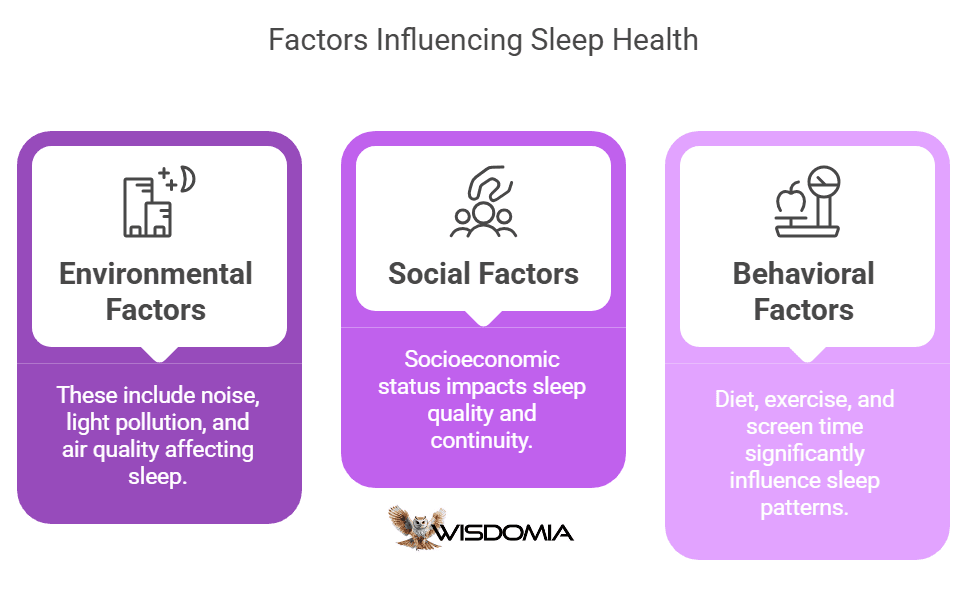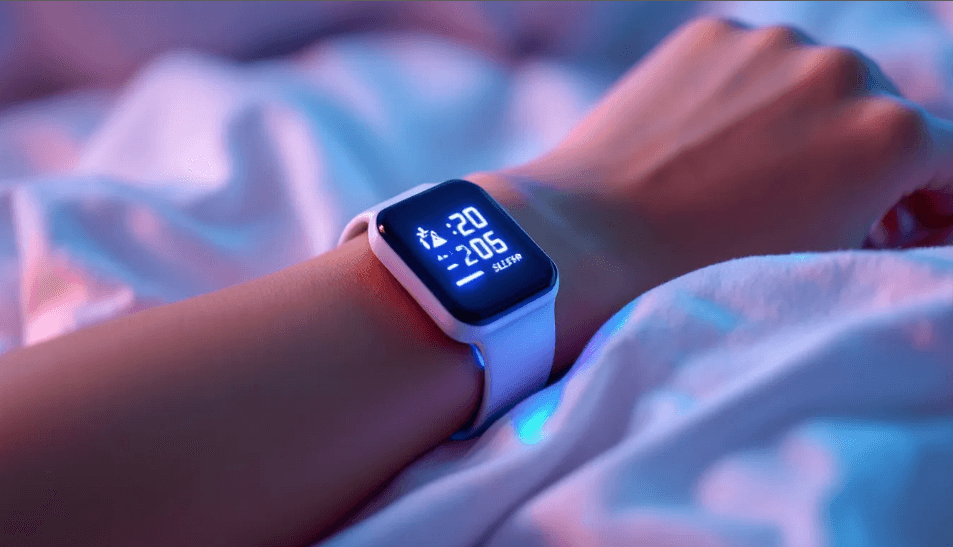Sleep Wellbeing Economy Ecosystem
Dinis GuardaAuthor
Tue Mar 25 2025

As technology automates more aspects of daily life, the importance of sleep and wellbeing continues to grow. The sleep wellbeing economy ecosystem highlights the link between rest, personal health, and economic productivity, showing that investing in sleep leads to improved wellbeing, cognitive function, and financial outcomes for individuals, businesses, and society. Research consistently demonstrates that quality sleep enhances mental health and economic resilience, making it a crucial pillar of a thriving future.
Sleep is part of our lives. As we automate tech for everything in our lives, sleep and wellbeing becomes more and more important.
The concept of a "sleep wellbeing economy ecosystem' recognises the interconnectedness of sleep, individual wellbeing, and economic productivity, highlighting the potential for investing in sleep health to boost both personal and societal outcomes.
Sleep brings a new sort of value capital for each of us and society, and all studies display that sleep wellbeing results in increased personal wellbeing, productivity, and economic outcomes for the individual, businesses, and societies. We also outline the multilevel impact of sleep on society and associated cognitive abilities, mental/brain health, and economic indicators, providing evidence for the substantial returns on investment in sleep health initiatives.
Here's a breakdown of the key aspects:
The Importance of Sleep
Adequate sleep is fundamental for both physical and mental wellbeing. It significantly impacts mood, cognitive function, and overall quality of life. During sleep, the body undergoes essential processes such as muscle repair, immune system support, and cardiovascular health maintenance. Mentally, sleep plays a crucial role in emotional regulation, stress reduction, and memory consolidation, which are vital for maintaining good mental health.
Without sufficient sleep, individuals may experience mood disturbances, decreased cognitive performance, and an increased risk of mental health disorders like anxiety and depression. Furthermore, sleep deprivation can lead to reduced productivity, as it impairs attention, decision-making, and problem-solving skills, ultimately affecting work performance and daily functioning.(Zhang Chong, 2024)
The Sleep Wellbeing Economy
The sleep economy is a rapidly expanding sector that includes a wide range of products, services, and interventions designed to enhance sleep health. This market has experienced significant growth over recent years, with the global 'sleep economy' estimated to be worth nearly $600bn this year, up from USD 432 billion in 2019.
The sleep market itself, which focuses more on specific sleep-related products and services, was valued at USD 63.98 billion in 2023 and is expected to grow to USD 108.21 billion by 2032, with a compound annual growth rate (CAGR) of 5.91%. This growth underscores the increasing awareness and investment in sleep health worldwide.
The sleep tech market, a subset of the broader sleep economy, is also booming, with a projected growth from USD 23,054.4 million in 2025 to USD 64,691.8 million by 2033, driven by technological advancements and rising awareness of sleep disorders.
The sleep economy offers substantial investment opportunities, attracting private equity firms and other investors due to its potential for growth and profitability. Beyond products, the sleep economy is interconnected with broader societal factors, including environmental and policy considerations. Creating supportive environments for healthy sleep habits involves not just individual actions but also public health initiatives and policy changes.
Ecosystem Components
Creating an optimal sleep environment involves several key components, each playing a crucial role in promoting better sleep quality. Ambiance Adjustment is fundamental in setting up a conducive sleep space. This includes managing factors such as bedding, lighting, and temperature.
For instance, using comfortable bedding and maintaining a cool, dark environment can significantly enhance sleep quality. Additionally, light-blocking shades and blackout curtains can help reduce ambient light, which is essential for regulating the body's circadian rhythms. Temperature management is also vital, as a room that is too hot or cold can disrupt sleep patterns. By adjusting these environmental factors, individuals can create a sleep-friendly ambiance that supports restorative sleep.
Factors Influencing Sleep Health

Sleep health is influenced by a variety of factors, including environmental, social, and behavioral elements. Environmental Factors such as noise, light pollution, and air quality can significantly disrupt sleep patterns. For instance, exposure to nocturnal environmental noise, particularly from transportation, is a major cause of sleep disturbances, leading to measurable biological changes and stress responses.
Similarly, light pollution from sources like streetlights and billboards can interfere with melatonin production, making it harder to fall asleep and reducing sleep quality. Social Factors also play a crucial role, with socioeconomic status being a significant determinant of sleep health. Individuals from lower socioeconomic backgrounds often experience poorer sleep continuity and quality due to limited access to healthcare and supportive environments.
Behavioral Factors such as diet, exercise, and screen time also have a profound impact on sleep patterns. A healthy diet and regular physical activity are associated with improved sleep quality, while excessive screen time can disrupt sleep by reducing physical activity and altering bedtime habits (Tambalis KD at al, 2020)..
Towards a Wellbeing Economy
A wellbeing economy shifts the focus from purely economic growth to prioritising human and environmental wellbeing. This approach recognises that traditional measures like GDP are insufficient for capturing the full scope of societal success, as they often overlook critical aspects such as health, happiness, and environmental sustainability. By moving beyond GDP, a wellbeing economy can foster a more holistic understanding of economic success, one that includes metrics for health, social cohesion, and environmental quality.
For instance, initiatives like Bhutan's Gross National Happiness Index and the Human Development Index provide alternative frameworks for evaluating societal progress. Promoting healthy sleep is an integral part of this vision, as it contributes to improved physical and mental health, which are foundational elements of a wellbeing economy.
The last years saw the emergence of an entire wellbeing sleep ecosystem - economy. There are an increasing number of organisations and companies developing sleep solutions and lifestyle ways associated with smart/connected systems, methodologies, wearable devices that can monitor sleep or improve the sleep quality of the wearer.
In our fast-paced lives and always-on society, sleep has become a luxury. For some, burning the midnight oil is worn like a badge of honour. But increasingly, the pendulum is swinging from staying up to shutting down.
The sleep wellbeing problem and and its economic implications
In today's fast-paced world, sleep deprivation has become a silent epidemic, impacting health, productivity, and the economy. With rising awareness of mental well-being and workplace burnout, the importance of quality rest is gaining recognition:
- One-third of US adults don’t get enough sleep.
- Sleeping 6 hours or fewer results in a 13% higher mortality rate.
- Lack of sleep costs US businesses $411B each year.
What’s happening: As concerns related to burnout and mental health grow, while mindfulness goes mainstream, sleep is emerging as a billion-dollar pillar of the wellness economy.
The Sleep Stack

Going beyond DTC mattresses and Casper’s less-than-stellar IPO, sleep-focused companies and products are revolutionising the sleep stack.
- Smart beds: Eight Sleep’s smart mattress ($70M in funding), chiliPAD’s temperature-controlled mattress cover, and Beddit’s under-the-mattress sleep monitor (acquired by Apple) are upgrading the regular old bed.
- Wearables: WHOOP’s wrist-worn tracker ($100M in funding), the ?URA ring ($20M), the Dreem headband ($57M), and upstarts like Beddr ($5.6M) are taking a data-driven approach to sleep improvement.
- Bedding: Boll & Branch raised $100M for sustainably sourced sheets. Parachute raked in $45M for bedding essentials. And sleep accessories like weighted blankets and the OSTRICHPILLOW have done millions in sales.
- Consumables: Melatonin will be a $2B market by 2024. Recently, Remrise raised $8M for plant-based sleep aids. And supplement manufacturers like Vital Proteins, The Nue Co., and Moon Juice are using functional ingredients in concoctions to enhance sleep.
- Apps: Calm and Headspace want to corner the market, but Sleep Cycle, Pzizz, and Pillow are giving chase. Of note, searches for “sleep app” exceed those for “meditation app”, so expect the competition to intensify.
- Therapeutics: Medical devices are booming alongside the consumer sleep market. By 2025, the sleep apnea device market will reach $9.5B. Count Philips Respironics and ResMed among other billion-dollar companies in the space.
Sleep-as-a-Service
Not sleeping is not an option. And now that the mental, physical, and economic costs of not sleeping are clear, getting some shut-eye is finally getting the attention it deserves.
As consumers seek out solutions for optimising and enhancing sleep, the creation of new products, technologies, and companies will fuel the billion-dollar sleep economy. At the same time, and perhaps more interestingly, the cultural shift away from hustle culture and toward a sense of work-life balance could help foster a culture of sleep.
While employers have long paid lip service to corporate wellness, concerns around mental health have made Corporate America ground zero for addressing stress, burnout, and depression. Similarly, as a lack of sleep proves to be detrimental to the bottom line, creating a sleep-first culture will prove to be a worthwhile investment.
Two things: One, expect to hear more about sleep as a business issue. And two, whether you start, invest in, or pivot to sleep-as-a-service for employers, the iron is hot.
The Future of Wellbeing Begins with Sleep
As we stand at the intersection of technological innovation and human potential, the sleep wellbeing economy emerges as a critical frontier of personal and societal transformation. By recognising sleep not just as a biological necessity but as a strategic asset, we unlock a powerful pathway to enhanced individual performance, organisational productivity, and broader economic resilience.
The future belongs to those who understand that investing in sleep is investing in human capital – a holistic approach that promises to redefine our understanding of health, productivity, and economic success. Businesses, policymakers, and individuals alike must now view sleep as a fundamental pillar of personal and collective wellbeing, positioning it at the core of our economic and social strategies. The sleep revolution is not just coming – it's already here, waiting to be embraced by those visionary enough to recognise its transformative potential.
previous
Emotional Intelligence and AGI: Understanding the Future of Human-Machine Interaction
next
20 Stunning Places to Experience a Beautiful Sunset Around the World
Share this

Dinis Guarda
Author
Dinis Guarda is an author, entrepreneur, founder CEO of ztudium, Businessabc, citiesabc.com and Wisdomia.ai. Dinis is an AI leader, researcher and creator who has been building proprietary solutions based on technologies like digital twins, 3D, spatial computing, AR/VR/MR. Dinis is also an author of multiple books, including "4IR AI Blockchain Fintech IoT Reinventing a Nation" and others. Dinis has been collaborating with the likes of UN / UNITAR, UNESCO, European Space Agency, IBM, Siemens, Mastercard, and governments like USAID, and Malaysia Government to mention a few. He has been a guest lecturer at business schools such as Copenhagen Business School. Dinis is ranked as one of the most influential people and thought leaders in Thinkers360 / Rise Global’s The Artificial Intelligence Power 100, Top 10 Thought leaders in AI, smart cities, metaverse, blockchain, fintech.










